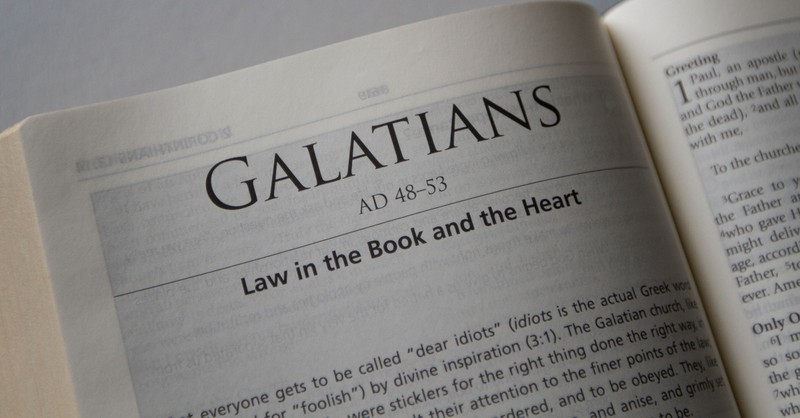Three Sneaky Ways 'There Is Neither Jew nor Gentile' (Galatians 3:28) Gets Misinterpreted

There is neither Jew nor Gentile, neither slave nor free, nor is there male and female, for you are all one in Christ Jesus. – Galatians 3:28
We often will hear the verse above quoted in sermons and even on social media. After all, the message does appear to fit the rules of our modern society, a society that seeks to break down labels and divisions.
But how often do we find that our own worldview lenses and biases may turn this verse into an eisegesis interpretation of how to live, based on how our culture tells us to? What does this verse actually mean in the context of this passage, and what are some of the massive ways we see the verse exploited and misinterpreted today?
In this article, we’ll dive into the numerous misinterpretations of this verse and analyze what Paul actually said when he wrote this verse in Galatians.

What Is the Context of 'There Is Neither Jew nor Gentile'?
The New Testament world was a world of distinctions. In Galatians 3, Paul sees these divisions in the church and decides to address them.
First, Jews and Gentiles didn’t get along, and for good reasons.
Jews, who were frustrated the Gentiles got a “free pass” into Christianity, without formerly having to follow the vigorous statutes of Torah law, cried foul. They convinced many Gentiles that they would need to engage in some Jewish practices such as circumcision of males (Galatians 5:2).
Paul saw these divisions and wanted to make it clear that Christianity wasn’t a Judaism 2.0. That through Jesus’ death and resurrection, he broke down the barrier between Jews and Gentiles and their ability to come to saving faith.
Second, we have a distinction between slave or free.
Slavery did look slightly different during biblical times, often reflecting more of the idea of an indentured servant. Still, even if there was a distinction in slavery practices, this didn’t stop people in the church from playing favorites with the rich (James 2).
Paul here shows that wealth distinctions don’t matter in the body of the church either. We can see a similar appeal to see those in lowly positions as equal brothers in Christ in the entire book of Philemon.
Finally, Paul breaks down the divide between males and females in the body of Christ.
During the New Testament times, women were considered to be second class citizens. Their testimony did not hold up in a court of law, and they struggled to thrive or even live in a society without the help of a husband or a male relative if their husband had passed away and they didn’t remarry.
Paul encourages Christians to see one another as equals, that we all (no matter what the cultural distinction) make up the body of Christ.
What Are Some Common Misinterpretations of 'There Is Neither Jew nor Gentile'?
It’s a beautiful, and likely very controversial message, during the time Paul had written this verse. But the verse has succumbed to a number of pitfalls in terms of interpretations today. We’ll discuss some of these below.
First, we will often see social media posts that claim this verse promotes transgenderism or the gender-fluid spectrum when Paul says there’s no distinction between man or woman. Those who propose this ignore the fact that Paul also wrote several verses on gender distinctions and roles in other books such as Ephesians.
Egalitarian and complementarianism arguments aside, the verse falls into this first trap because people try to squeeze it into their modern interpretation of gender.

Secondly, some people claim the verse encourages color-blind Christianity. In other words, the verse tells us to not see the differences that make us beautiful and unique parts of the body of Christ.
There are, of course, multiple problems with this interpretation. First of all, Scripture makes it clear that God has given each believer unique gifts. Some have prophecy, others teaching, etc. (1 Corinthians 12). If we follow the false interpretation of color-blind Christianity, then we have no uniqueness. We have nothing that sets us apart from others in the body of Christ.
It makes no sense for a body to be composed of only arms or only eyebrows. Paul here doesn’t tell Christians to become a monolith. God created us with unique features and gifts for a reason.
Finally, people may try to use the verse as a reason to say males and females have absolutely no differences at all. That God did not imbue them with distinctive traits.
This, by no means, bashes any stay-at-home dads or working mothers, as we see many of the latter even during the time of the New Testament, when it was seen as a bad thing for women to work or be the main breadwinner.
But as discussed in our second point, God did endow humans with unique gifts, and in the case of male and female, God often will give certain aptitudes and gifts to males and to females.
In summary of all the erroneous positions, people still try to assert that the passage supports transgenderism, and color-blindness in terms of gender and race.
Why Does the Phrase 'Neither Jew Nor Gentile' Matter Today?
This verse matters for a number of reasons.
First, the verse stresses the importance of ignoring fabricated divisions. During the time of Paul, the early church had a tough time uniting Jews and Gentiles, as years of wars and cultural practices differed vastly between the two groups. Paul hopes through the message of the Gospel to show them the unifying factor between all of them. That it doesn’t matter what ethnic, economic, or fill-in-the-blank background you come from, if you have accepted the gift of salvation, you are united in the family of Christ.
Second, we need to note this verse does not encourage Christian color-blindness or transgenderism. God does create us with unique gifts and abilities. For this reason, Christianity isn’t a monolith religion.
We don’t have one right way to praise God, one right way to serve others, or one right way to share the Gospel.

A Prayer Based on 'There Is Neither Jew nor Gentile'
Dear Heavenly Father,
You have created all of us so uniquely. You give us all spiritual gifts that help us to make up the body of the church.
Help us not to let cultural divides tear us apart in the church. Remind us that we all are your sons and daughters.
In the same way, remind us to celebrate the differences and uniqueness of the body of the church. That you have called people of all backgrounds to share your Gospel and to share about the hope of salvation.
Amen.
Paul doesn’t call us to disregard our uniqueness. But he does remind us not to let what makes us special divide us as a church.
As Christians in a constantly shifting culture, we need to cling to the truth of Scripture. We need to analyze the overall context of verses and what they mean, versus what our society tells us they mean.
The Bible often runs counter to every single culture. The Galatians who received this verse most likely did with some controversy and pushback. In the same way, we may see our culture doing the same when Scripture doesn’t align completely with what modern society says.
Sources
Galatians 3:28 - Gill's Exposition of the Bible
Interpretation - International Standard Bible Encyclopedia
Galatians 3 - Matthew Henry's Bible Commentary
"Galatians 3:28" by Aaron L. Garriott (Tabletalk)
Recommended for You:
What Are Exegesis and Eisegesis? 2 Ways to Read the Bible
5 Things Every Christian Needs to Know about the Transgender Debate
The Importance of the Sexual Identity Bostock Supreme Court Case
4 Great Reasons to Not Be ‘Color Blind’
Photo Credit: ©GettyImages/AaronAmat
Hope Bolinger is an acquisitions editor at End Game Press, book editor for hire, and the author of almost 30 books. More than 1500 of her works have been featured in various publications. Check out her books at hopebolinger.com for clean books in most genres, great for adults and kids. Check out her editing profile at Reedsy.com to find out about hiring her for your next book project.
This article is part of our larger resource library of popular Bible verse phrases and quotes. We want to provide easy to read articles that answer your questions about the meaning, origin, and history of specific verses within Scripture's context. It is our hope that these will help you better understand the meaning and purpose of God's Word in relation to your life today.
"Be Still and Know that I Am God"
"Pray Without Ceasing"
"Fearfully and Wonderfully Made"
"All Things Work Together for Good"
"Do Not Fear"
Originally published September 08, 2020.







